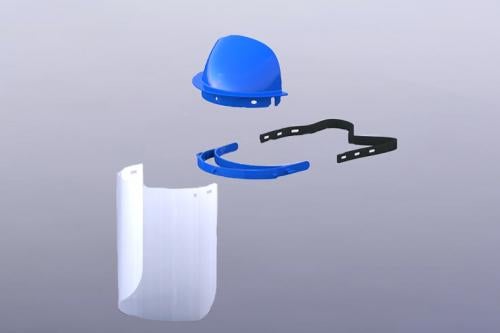
To the rescue: UCLA bioengineers create reusable COVID-19 face shields
First responders and health care workers have been putting their lives on the line to treat the tidal wave of COVID-19 patients flooding emergency rooms and intensive care units. Meanwhile, hospitals across the country are facing a shortage of medical-grade personal protective equipment, and manufacturers haven't been able to meet the rising demand with high-quality solutions.
In response, bioengineers from the UCLA School of Dentistry, UCLA Samueli School of Engineering and UCLA Eli and Edythe Broad Center of Regenerative Medicine and Stem Cell Research have taken to their computers and 3D printers and developed a reusable, durable face shield — a critical piece of equipment that protects the eyes, nose and mouth from infection-causing droplets. The prototype was reviewed and approved by UCLA Health on April 3, and the design has been shared on the National Institutes of Health’s 3D Print Exchange.
The device’s headband can be mass-produced using 3D injection molding, while the clear plastic shield is made by laser cutting. The first batch of face shields will go to UCLA Health; the engineers say that as many as 25,000 high-quality headbands can be produced in a week to meet the demand. Some 50,000 plastic shields can be produced within weeks as well. The final products will be manufactured by medical device companies providing the service at cost, using facilities certified by the U.S. Food and Drug Administration.
The reusable face shield, which builds on an earlier single-use prototype made by Jacob Schmidt, a bioengineer and director of the UCLA Samueli Makerspace, is a highly scalable solution that provides more durability, splash protection, adjustability and prolonged comfort than the single-use shield. It is also compatible with most hospital-grade disinfectants.
The design and development was led by Dr. Ben Wu, a dentist-scientist who chairs the advanced prosthodontics division at the UCLA School of Dentistry and holds a joint appointment at UCLA Engineering, with support from Schmidt; Doug Daniels, emerging technologies librarian and director of the UCLA Library’s Lux Lab; Wu Lab bioengineers Yun Chang Lee, Chase Linsley and Yulong Zhang; and colleagues from UCLA Health and the David Geffen School of Medicine at UCLA.
“We are glad to support our frontline colleagues by providing a scalable, robust solution that has built-in features to adapt to supply-chain changes,” said Wu, who also serves as executive director of the Innovative Digital Dentistry Systems unit at the dentistry school and is a member of the UCLA Broad Stem Cell Research Center.
To overcome the global supply-chain shortage of raw materials needed for clear plastic sheets, the team collaborated with partners from the defense and medical-device industries to leverage their network. Through this public–private partnership, the team acquired enough resources to significantly scale up face shield production.
With the global shortage of personal protective equipment, doctors and nurses have been forced to reuse disposable supplies or simply to go without, putting them at greater risk of contracting and spreading the virus. UCLA teams are working around the clock to engineer a number of highly scalable manufacturing solutions aimed at protecting these workers. Wu is leading several other interdisciplinary teams seeking to address additional PPE shortages, including N95 respirators, shields for powered air-purifying respirators, or PAPRs, and other specialized consumables critical for treating patients who have tested positive for COVID-19.
“We are grateful to our colleagues across campus for partnering with us and sharing their ingenuity,” said Johnese Spisso, president of UCLA Health and CEO of the UCLA Hospital System. “This collaboration will help UCLA Health doctors and nurses save lives by conserving supplies and protecting patients.”
Funding for this project was provided in part by UCLA Dentistry alumna Dr. Margaret Pan Quon and Ronald Quon, who helped purchase the 3D printers, and by the Shapiro Family Charitable Foundation's support for the Innovative Digital Dentistry Systems, or iDDS.